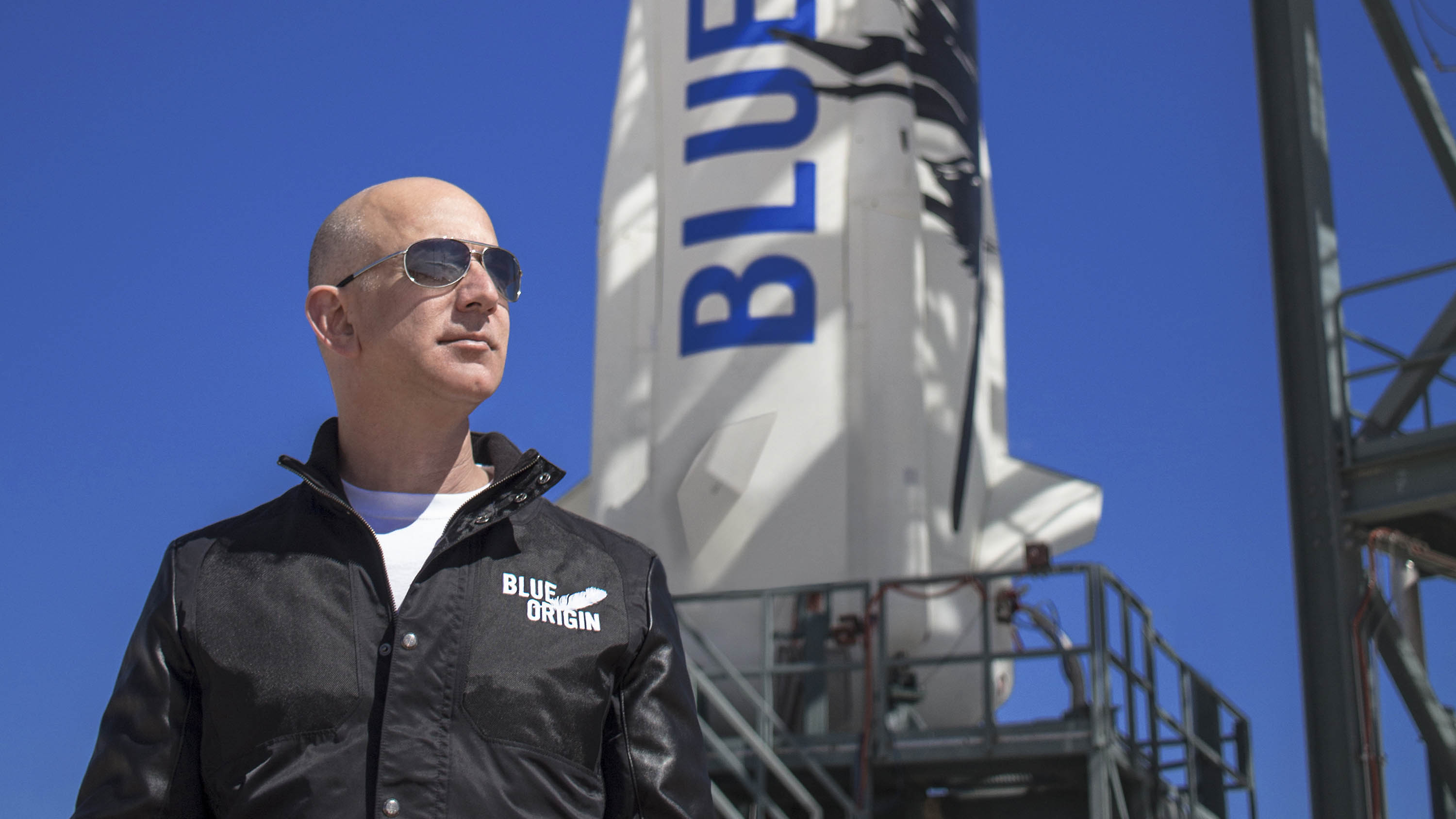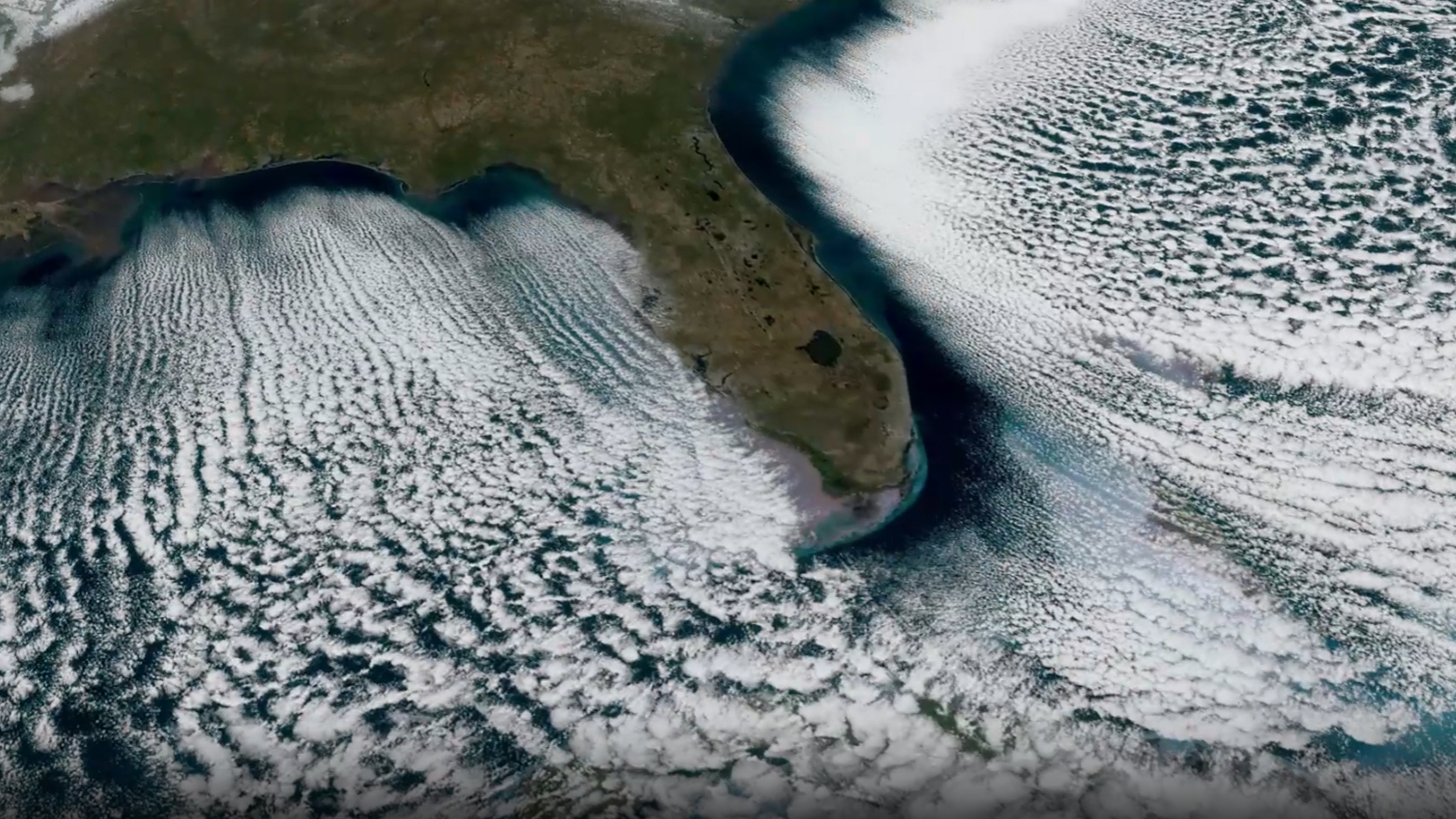With Virgin Galactic's launch of Richard Branson in the books, all eyes are on Blue Origin and Jeff Bezos

Breaking space news, the latest updates on rocket launches, skywatching events and more!
You are now subscribed
Your newsletter sign-up was successful
Want to add more newsletters?

Delivered daily
Daily Newsletter
Breaking space news, the latest updates on rocket launches, skywatching events and more!

Once a month
Watch This Space
Sign up to our monthly entertainment newsletter to keep up with all our coverage of the latest sci-fi and space movies, tv shows, games and books.

Once a week
Night Sky This Week
Discover this week's must-see night sky events, moon phases, and stunning astrophotos. Sign up for our skywatching newsletter and explore the universe with us!

Twice a month
Strange New Words
Space.com's Sci-Fi Reader's Club. Read a sci-fi short story every month and join a virtual community of fellow science fiction fans!
Next billionaire up!
Richard Branson completed his much-anticipated mission on Sunday (July 11), riding to suborbital space and back on the first fully crewed flight of Virgin Galactic's VSS Unity space plane.
But that was just the first of two planned billionaire space jaunts this month. Blue Origin boss Jeff Bezos is scheduled to fly to the suborbital frontier on his company's New Shepard craft on July 20, the 52nd anniversary of the Apollo 11 moon landing. It will be the first crewed spaceflight for New Shepard, which consists of a reusable rocket-capsule combo.
Related: 'Welcome to the dawn of a new space age,' Branson says after launch
Blue Origin announced the July 20 target in early May, also revealing then that the company would auction off a seat aboard the landmark mission. The company unveiled further details at a deliberate, intrigue-building pace. In early June, for example, Blue Origin announced that Bezos will fly on the mission, along with his brother Mark — news that surely juiced the bidding for the open seat, which eventually sold for $28 million. (We still don't know who bought that seat; the person's identity will presumably be revealed closer to the launch date.)
Then, on July 1, Blue Origin announced that the fourth and final person flying on the July 20 mission will be pioneering aviator Wally Funk. The 82-year-old Funk was one of the famous "Mercury 13," a group of women who, in the early days of the space age, passed the same physiological screening tests that NASA put its astronauts through.
The tests the Mercury 13 endured were part of a private, non-NASA program. The agency didn't seriously consider accepting female astronauts back then; NASA wouldn't launch a woman to space until Sally Ride went up on the space shuttle Challenger's STS-7 mission in 1983.
Breaking space news, the latest updates on rocket launches, skywatching events and more!
So it's some long-overdue justice that Funk will finally reach space this month, 60 years after she showed that she has the right stuff. And she'll break a record in the process, becoming the oldest person ever to reach the final frontier. (That mark is currently held by John Glenn, who was 77 when he went up on the STS-95 mission of the space shuttle Discovery in October 1998.)
Virgin Galactic announced that it planned to launch VSS Unity's fourth spaceflight, and that Branson would be aboard, on July 1 — the same day we learned that Funk would fly on New Shepard. Branson and Virgin Galactic stressed that Unity would fly on July 11 simply because it was ready to do so, and that they weren't trying to beat Bezos to space. But it's hard to imagine that Blue Origin and its chief weren't at least a little miffed that their thunder was stolen.
For example, Blue Origin recently reminded folks that New Shepard gets above the Kármán line, the 62-mile-high (100 kilometers) mark that is often regarded as the boundary of space — and that VSS Unity doesn't quite get there.
"From the beginning, New Shepard was designed to fly above the Kármán line so none of our astronauts have an asterisk next to their name. For 96% of the world’s population, space begins 100 km up at the internationally recognized Kármán line," Blue Origin wrote via Twitter on Friday (July 9).
"Only 4% of the world recognizes a lower limit of 80 km or 50 miles as the beginning of space. New Shepard flies above both boundaries. One of the many benefits of flying with Blue Origin," the company added in another tweet.
A post shared by Jeff Bezos (@jeffbezos)
A photo posted by on
(For what it's worth, NASA, the U.S. military and the U.S. Federal Aviation Administration award astronaut wings to anyone who gets at least 50 miles up. And some researchers believe that 50 miles is actually the right place to put the Kármán line, which represents the spot where the forces of orbital dynamics become dominant over those of aerodynamics.)
Maybe there's no snark behind those two tweets; after all, highlighting the perceived advantages of your spaceflight system over that of your chief competitor makes good business sense. Regardless, Blue Origin soon struck a more conciliatory tone, wishing Virgin Galactic a safe flight and congratulating the company after VSS Unity touched down.
And Bezos gave his own shout-out Sunday via Instagram: "@richardbranson and crew, congratulations on the flight. Can’t wait to join the club!"
In eight short days, that wait will be over.
Mike Wall is the author of "Out There" (Grand Central Publishing, 2018; illustrated by Karl Tate), a book about the search for alien life. Follow him on Twitter @michaeldwall. Follow us on Twitter @Spacedotcom or Facebook.

Michael Wall is a Senior Space Writer with Space.com and joined the team in 2010. He primarily covers exoplanets, spaceflight and military space, but has been known to dabble in the space art beat. His book about the search for alien life, "Out There," was published on Nov. 13, 2018. Before becoming a science writer, Michael worked as a herpetologist and wildlife biologist. He has a Ph.D. in evolutionary biology from the University of Sydney, Australia, a bachelor's degree from the University of Arizona, and a graduate certificate in science writing from the University of California, Santa Cruz. To find out what his latest project is, you can follow Michael on Twitter.
